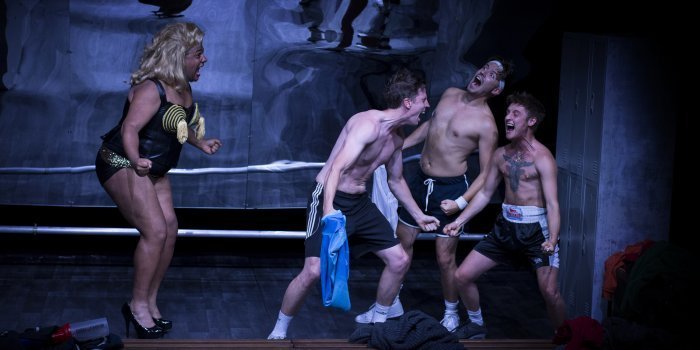In this age of #MeToo and the blurring lines of an increasingly non-binary world, what does it mean to be a man? What exactly is masculinity?
Kit Redstone and Rhum and Clay Theatre Company attempt to provide some of the answers in the upcoming production of Testosterone, set to play The Cultch’s York Theatre in October.
Written by Redstone, Testosterone uses an eclectic mix of theatrical storytelling, drawing on his firsthand experiences and thoughts about gender. But more than just a story about a trans man, it is as much about masculinity and finding a place in a very gendered world.
Via email from London, we find out more from Redstone about the origins of Testosterone and what Vancouver audiences can expect.
This interview has been edited.
Q. What was the impetus for Testosterone?
Testosterone was born from a casual kitchen conversation between myself and Julian Spooner of Rhum and Clay. We were chatting and laughing about some of my experiences as a ‘new man’. We both very much wanted to make a piece of work about masculinity and decided to collaborate on a show together.
Initially we were not planning to focus on my transition in the work, but rather look at masculinity in general. We teamed up with Rhum and Clays co-artistic director, Matt Wells, as well as adding a musical element with singer and performer Daniel Jacob. Our challenge was to marry three very distinct styles of theatre to tell our story – Rhum and Clay’s physical theatre, my meta-theatrical techniques and Dan’s musical element.
Q. Why this story now?
We were in the early development of the piece when Trump got elected and then later with the #MeToo movement. It felt really urgent to address notions of toxic masculinity and explore the question, what does it mean to be a man?
We also decided to use my stories as a trans man to act as a metaphor for identity in general which of course enabled us to introduce the audience to the type of protagonist they may not see very often. This also felt very urgent alongside the current public debate around trans identity and the large backlash against developments in policy to protect trans people.
Q. How much of Testosterone is based on your own experience?
The show is very autobiographical with a lot of creative license. As the writer of the show I was happy to share my stories as long as they served the bigger picture of the piece, which was masculine identity, and as long as I had complete autonomy over how they were written.
My previous work has not been autobiographical at all and it was incredibly important to me that the show was about more than being trans, that it spoke to, and was relevant to anyone.

Q. Why was it important to tell the story via live theatre?
With theatre you can create a real intimacy with the audience, especially when you take advantage of the live-ness and the here and now.
The show uses direct address to really engage and draw the audience in, allowing them to come on my journey with me. There is a moment of complete vulnerability at the end of the show which feels very powerful because the audience has really been there with me and it feels earned, if that makes sense.
As a performer using autobiographical material in such a raw way I actually feel buoyed and supported by the audience. By the end I feel like we have gone on a journey together which I can’t imagine happening in such a visceral way with any other medium.
Q. What do you say to potential non-trans audiences who may not see this story as for them?
This show is about identity and men. It happens to have a trans protagonist, but everything we deal with in the show is pertinent for everybody. It’s also very funny and absurd; none of us wanted to make a piece that felt worthy and heavy. We do have dark bits in the show, uncomfortable bits, but most of it is raucous and wild.
Personally, I’ve had enough of trans narratives about suffering. This show isn’t about the transition itself, but rather the world of men that a trans man enters. It could equally be a story about any outsider entering a new world. And it’s the universality of this experience that speaks to the audience.
Q. Is there something you hope audiences will take away with them?
We hope that the audiences will feel inspired to look at and address the notions of gender and identity which affect us all. To look at the world of the gender they inhabit and how they behave within it. To ask themselves questions about the behaviour that they might unwittingly engage in or enable.
But also, to feel, especially those who have never encountered a trans person before, that they have spent an evening with a trans man and been allowed to laugh with him about the absurdities of his transition rather than feel they have been preached to.
Testosterone opens at The Cultch’s York Theatre (639 Commercial Dr, Vancouver) on October 2 and continues through October 13. Visit thecultch.com for tickets and information.

